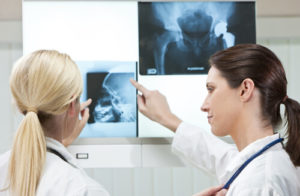DePuy Hip Replacement Recall

While any hip replacement device has risks, one of the most dangerous products to surface in recent years has been metal-on-metal (“MoM”) hip systems. Complications associated with MoM hip systems include pain, infection, tissue damage and other serious health issues that often require additional surgeries to repair. The increasing reports of adverse events following MoM hip implants in the U.S. has prompted manufacturer recalls. Thousands of dangerous and defective device lawsuits are currently pending in state and federal courts. Our North Carolina defective hip replacement lawyers are here to help you.
If you have experienced problems following a hip replacement procedure, contact the Raleigh defective products attorneys at Hardison & Cochran today. We are committed to holding medical products manufacturers accountable for placing dangerous products on the market, including metal-on-metal hip repair systems.
Call our injury attorneys now at 800-434-8399 or reach us through our online form for a free case evaluation. We serve clients throughout North Carolina, including Raleigh, Cary, Durham and Fayetteville.
Problems With Metal-On-Metal Systems
Deterioration of the hip joint can be painful and significantly limit mobility. For people with the worst symptoms, doctors sometimes recommend total hip replacements or hip resurfacing. Implants may be made of ceramic, plastic or metal. However, metal-on-metal products have come under serious scrutiny due to concerns that metal particles may wear off and enter the surrounding tissue and bloodstream. In fact, the U.S. Food and Drug Administration has gone as far as to say that although doctors are careful to position MoM implants as precisely as possible, there is “no way to fully avoid the production of metal particles” in an MoM system.
Complications associated with the release of metal particles include:
- Tissue death
- Pain
- Swelling
- Loosening of the hip implant
- Hip failure
- Metal toxicity
- Cardiac problems
- Chest pain
- Groin pain
- Shortness of breath
- Weight gain
- Fatigue
- Weakness or numbness
- Thyroid problems
- Kidney issues
- Damage to the nervous system
- Changes in urination habits
Recalled Metal-on-Metal Hip Products
In 2010, DePuy Orthopaedics (a division of Johnson & Johnson) issued a recall for 93,000 of its DePuy ASR™ Acetabular Cup System and DePuy ASR™ Hip Resurfacing System ASR™ products due to reports of high failure rates and the need for many patients to undergo additional “revision” surgeries to correct problems caused by the metal-on-metal devices. Since the recall, defective products lawsuits have been filed in federal court (DePuy Orthopaedics, Inc. ASR Hip Implants Products Liability Litigation MDL No. 2197) and at the state level, with the first trials set to begin in late 2012 and into 2013.
Though not recalled, DePuy also manufactures the Pinnacle metal-on-metal hip, which has also been noted to have a high failure rate and similar complications associated with the ASR™ systems.
Hip replacement complaints are not limited to DePuy. Both the BioMet M2a Hip and Wright Conserve Hip have also been subject to litigation due to reports of failure and metal-related complications. To date, those products have not been recalled.
What You Should Do If You Have A Defective Hip Implant
People who are injured by dangerous medical devices may be eligible for compensation to help with the cost of medical bills, additional surgeries, rehabilitation, pain and suffering and other damages resulting from the defective product.
DePuy Orthopaedics may offer to pay for certain costs due to problems with your hip
replacement, but there are additional damages that they will not pay for. If you are the recipient, or you know a recipient of the DePuy ASR™, DePuy Pinnacle or any other metal-on-metal hip system, you should speak with an attorney who can explain your legal options before speaking with any representative from the manufacturer.
DO NOT sign anything without an attorney, as that may impair your ability to further recovery. DePuy’s offer to pay costs will not cover your pain and suffering and other damages, and may not even cover all costs associated with necessary medical treatment for the defective hip.
Talk With Our DePuy Hip Replacement Lawyers Now
If you have any questions about your legal rights after receiving a defective hip implant, please feel free to contact our North Carolina defective medical device lawyers for a free consultation. Our attorneys are currently pursuing cases for those injured by DePuy products and can help you, too. Call Hardison & Cochran now at 800-434-8399 or contact us online.


